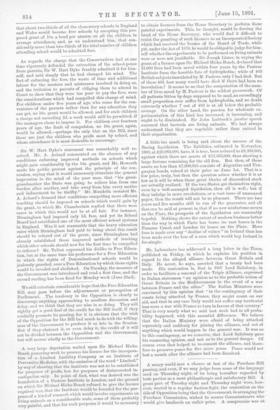Sir W. Hart Dyke's statement was remarkably well re- ceived.
Mr. A. Acland commented on the absence of any conditions enforcing improved methods on schools which might gain considerably by the 10s. grant, and Mr. Howorth made his public protest against the principle of the con- cession, saying that it would immensely stimulate the general impression in the mind of the poor man, that " his great- grandmother the State was going to relieve him from one burden after another, and take away from him every motive and inducement to be thrifty." Mr. Mundella restated Mr. A. Achand's demand that conditions compelling more efficient teaching should be imposed on schools which would gain by the grant, to which Mr. Chamberlain replied that there were cases in which this would not be at all fair. For instance, Birmingham bad imposed only ld. fees, and yet its School Board had established one of the most efficient school systems in England. Was it. not reasonable that the heavy education rates which Birmingham had paid to bring about this result should be relaxed out of the grant, since Birmingham had already established those improved methods of teaching which other schools should now for the first time be compelled to enforce ? Mr. Talbot expressed his dislike to Free Educa- tion, but at the same time his preference for a Free Education in which the rights of Denominational schools would be jealously guarded, over a Free Education by which those rights would be invaded and abolished. On Tuesday, the measure of the Government was introduced and read a first time, and the second reading has been fixed for Monday week (June 22nd).


































 Previous page
Previous page